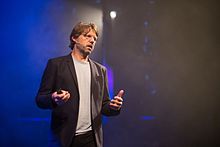Leo Kouwenhoven
Leo Kouwenhoven | |
|---|---|
 Leo Kouwenhoven in 2016 | |
| Born | 10 December 1963 |
| Nationality | Dutch |
| Alma mater | TU Delft |
| Awards | Spinoza Prize (2007) |
| Website | qutech |
Leo Kouwenhoven (born 10 December 1963) is a Dutch physicist known for his research on quantum computing, specifically in topological quantum computing experiments.
Kouwenhoven grew up in Pijnacker, a village near Delft, where his parents ran a farm. After losing the admission lottery for veterinary medicine he decided to study physics at Delft University of Technology (TU Delft).[1]
In 1992 he received his PhD cum laude at TU Delft; his promoter was Hans Mooij. In 1999 he became a professor at TU Delft.[1] In 2007 he received the Spinoza Prize, the highest Dutch academic award. In April 2012 his TU Delft research group presented experimental results that provided potential "signatures" of Majorana fermion quasiparticles.[2][3][4] These Majorana quasiparticles would be very stable, and therefore suitable for building a quantum computer.[5]
In 2018 his research group claimed to have proved the definitive existence of Majorana particles in a Nature publication.[6] However, the results could not be reproduced by other scientists, and the article had to be retracted in 2021 due to "insufficient scientific rigour".[7] [8][9][10] The researchers had excluded data points that contradicted their claims, with the complete data not supporting their conclusions.[11]
Two of the Majorana research papers involving Leo Kouwenhoven's group at QuTech were retracted due to data irregularities, leading to a couple of investigations by the TU Delft's Research Integrity Committee (CWI) and the Dutch Body for Scientific Integrity (LOWI) between 2020 and 2023.[a] While Kouwenhoven was found partly negligent in one case, no scientific integrity violations were confirmed.[12]
Kouwenhoven was reappointed as university professor at TU Delft in 2024.[12]
Personal life
[edit]Kouwenhoven has six sisters and is married to Vrije Universiteit Amsterdam professor Marleen Huysman.[1]
Notes
[edit]- ^ CWI and the LOWI led a first investigation between 2020 and 2022. The CWI conducted a second investigation from 2022 to 2023
References
[edit]- ^ a b c Hoeks, Louis (6 March 2016). "'Op de boerderij leerde ik dat wegduiken geen optie is'". Financieele Dagblad.
- ^ Bob Yirka (13 April 2012). "Researchers find possible evidence of Majorana fermions". phys.org. Retrieved 28 May 2024.
- ^ "Nanowetenschappers vinden langgezocht Majorana-deeltje". engineersonline.nl (in Dutch). Retrieved 28 May 2024.
- ^ Mourik, V.; Zuo, K.; Frolov, S. M.; Plissard, S. R.; Bakkers, E. P. a. M.; Kouwenhoven, L. P. (25 May 2012). "Signatures of Majorana Fermions in Hybrid Superconductor-Semiconductor Nanowire Devices". Science. 336 (6084): 1003–1007. arXiv:1204.2792. Bibcode:2012Sci...336.1003M. doi:10.1126/science.1222360. ISSN 0036-8075. PMID 22499805. S2CID 18447180.
- ^ Robert F. Service, Physicists Discover New Type of Particle — Sort Of, ScienceNOW, 12 April 2012
- ^ Zhang, Hao; Liu, Chun-Xiao; Gazibegovic, Sasa; Xu, Di; Logan, John A.; Wang, Guanzhong; van Loo, Nick; Bommer, Jouri D. S.; de Moor, Michiel W. A.; Car, Diana; Op het Veld, Roy L. M. (2018). "RETRACTED ARTICLE: Quantized Majorana conductance". Nature. 556 (7699): 74–79. arXiv:1710.10701. doi:10.1038/nature26142. ISSN 1476-4687. PMID 29590094. S2CID 4613547. (Retracted, see doi:10.1038/s41586-021-03373-x, PMID 33686283, Retraction Watch)
- ^ Zhang, Hao; Liu, Chun-Xiao; Gazibegovic, Sasa; Xu, Di; Logan, John A.; Wang, Guanzhong; Van Loo, Nick; Bommer, Jouri D. S.; De Moor, Michiel W. A.; Car, Diana; Op Het Veld, Roy L. M.; Van Veldhoven, Petrus J.; Koelling, Sebastian; Verheijen, Marcel A.; Pendharkar, Mihir; Pennachio, Daniel J.; Shojaei, Borzoyeh; Lee, Joon Sue; Palmstrøm, Chris J.; Bakkers, Erik P. A. M.; Das Sarma, S.; Kouwenhoven, Leo P. (2021). "Retraction Note: Quantized Majorana conductance". Nature. 591 (7851): E30. Bibcode:2021Natur.591E..30Z. doi:10.1038/s41586-021-03373-x. PMID 33686283. S2CID 232159790.
- ^ "Landmark article by QuTech researchers under scrutiny". Landmark article by QuTech researchers under scrutiny | TU Delta (in Dutch). 19 May 2020. Retrieved 8 March 2021.
- ^ Stan van Pelt (23 February 2021). "Hoe jonge onderzoekers het fundament wegsloegen onder de quantumdroom van een Delftse hoogleraar". de Volkskrant (in Dutch). Retrieved 8 March 2021.
- ^ Brouwer, Piet; Ensslin, Klaus; Goldhaber-Gordon, David; Lee, Patrick (2021). "Nature paper 'Quantized Majorana conductance', report from independent experts". Zenodo. doi:10.5281/zenodo.4545812. S2CID 244959752.
- ^ "Microsoft's Big Win in Quantum Computing Was an 'Error' After All". Wired.
- ^ a b "Timeline retracted Majorana papers". QuTech. Retrieved 23 October 2024.
